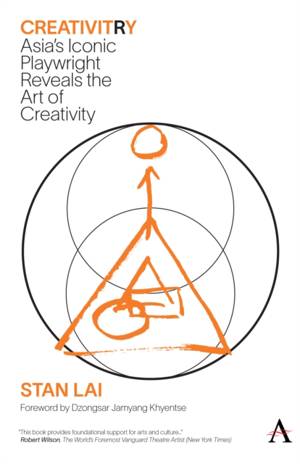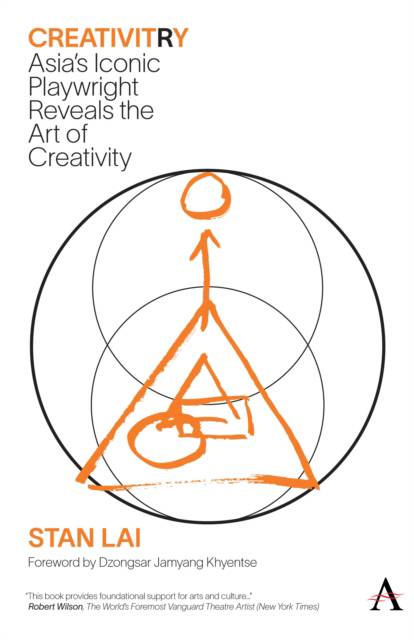
- Retrait gratuit dans votre magasin Club
- 7.000.000 titres dans notre catalogue
- Payer en toute sécurité
- Toujours un magasin près de chez vous
- Retrait gratuit dans votre magasin Club
- 7.000.0000 titres dans notre catalogue
- Payer en toute sécurité
- Toujours un magasin près de chez vous
Description
Asia's legendary playwright- director Stan Lai has written one of the unique works of our time, explaining that the mysterious act of creativity is actually a traceable function of mind, and there is a path to learn creativity through un-learning many of our habits picked up in life. His special map, as well as tailor-made exercises, lays out an awe-inspiring yet practical guide from a lifetime of creative work, revered in Asia by artists and business leaders alike. Through his extensive experience, the greatest living Asian playwright shows us how to cultivate a 'creative app' that works within us.
Matthieu Ricard says: "Stan Lai teaches us, how to see and how to do." Praised by Jack Ma, Ang Lee and other luminaries, this book is a rewrite by the author of his book that is the most prominent work on creativity in China, having sold over 700,000 copies. Robert Wilson calls the work "foundational support for arts and culture." Stan Lai is uniquely qualified to write on creativity, because he not only has four decades of creative experience, widely acclaimed as the greatest playwright in the Chinese language, but is also a dedicated educator. Shannon Jackson calls the work "A must-read from an internationally renowned artist."
Can creativity be taught? Most of the books and training in this area deal with skills for jumpstarting alternative thinking, brainstorming and other exercises, but do not deal with creativity itself. They don't tackle the obvious question: What is creativity and how can I get it? As one of the world's leading artists, Lai explains that the reason we don't think creativity can be taught is that we don't really understand what happens in the mysterious process. By slowing down the moment of inspiration, Lai lets us see exactly the elements involved in this complex process that lasts only an instant. Then he shows you how to prepare for this moment, through his unique Map of Creativity. This is a whole path of training in creativity, which he explains clearly and humour and compassion, and tailor-made exercises. Travis Preston says "Stan Lai guides us to the center of the creative moment and the ultimate unity of the spiritual and physical worlds."
Creativitry is a milestone in understanding and learning the creative act. Born in America, raised in Taiwan, with a career spanning the Chinese diaspora, Lai believes that we are all born creative, but the source to creativity has been blocked, by life. How to take down the barriers that are blocking the source from us is a task of un-learning many things that have become habits and put us into a so-called non-creative mode. Taking his cue from his Buddhist training that wisdom and method are both needed for success in any endeavour, he explains how 'wisdom' has mysteriously vanished from education systems all over. Most teaching in creativity focuses on method, which one learns in one's art. But we need another type of training, more urgently, the training for wisdom, which can only happen in the domain of life. To do, you must first be. To discover your creativity, you must first discover yourself. Octavian Saiu says, "This book is not a manual, but a statement of belief, an enduring message about how each of us can go beyond our limits."
Matthieu Ricard says: "Stan Lai teaches us, how to see and how to do." Praised by Jack Ma, Ang Lee and other luminaries, this book is a rewrite by the author of his book that is the most prominent work on creativity in China, having sold over 700,000 copies. Robert Wilson calls the work "foundational support for arts and culture." Stan Lai is uniquely qualified to write on creativity, because he not only has four decades of creative experience, widely acclaimed as the greatest playwright in the Chinese language, but is also a dedicated educator. Shannon Jackson calls the work "A must-read from an internationally renowned artist."
Can creativity be taught? Most of the books and training in this area deal with skills for jumpstarting alternative thinking, brainstorming and other exercises, but do not deal with creativity itself. They don't tackle the obvious question: What is creativity and how can I get it? As one of the world's leading artists, Lai explains that the reason we don't think creativity can be taught is that we don't really understand what happens in the mysterious process. By slowing down the moment of inspiration, Lai lets us see exactly the elements involved in this complex process that lasts only an instant. Then he shows you how to prepare for this moment, through his unique Map of Creativity. This is a whole path of training in creativity, which he explains clearly and humour and compassion, and tailor-made exercises. Travis Preston says "Stan Lai guides us to the center of the creative moment and the ultimate unity of the spiritual and physical worlds."
Creativitry is a milestone in understanding and learning the creative act. Born in America, raised in Taiwan, with a career spanning the Chinese diaspora, Lai believes that we are all born creative, but the source to creativity has been blocked, by life. How to take down the barriers that are blocking the source from us is a task of un-learning many things that have become habits and put us into a so-called non-creative mode. Taking his cue from his Buddhist training that wisdom and method are both needed for success in any endeavour, he explains how 'wisdom' has mysteriously vanished from education systems all over. Most teaching in creativity focuses on method, which one learns in one's art. But we need another type of training, more urgently, the training for wisdom, which can only happen in the domain of life. To do, you must first be. To discover your creativity, you must first discover yourself. Octavian Saiu says, "This book is not a manual, but a statement of belief, an enduring message about how each of us can go beyond our limits."
Spécifications
Parties prenantes
- Auteur(s) :
- Editeur:
Contenu
- Nombre de pages :
- 200
- Langue:
- Anglais
- Collection :
- Tome:
- n° 1
Caractéristiques
- EAN:
- 9781839993954
- Date de parution :
- 16-09-25
- Format:
- Livre broché
- Format numérique:
- Trade paperback (VS)
- Dimensions :
- 152 mm x 229 mm
- Poids :
- 453 g

Les avis
Nous publions uniquement les avis qui respectent les conditions requises. Consultez nos conditions pour les avis.






